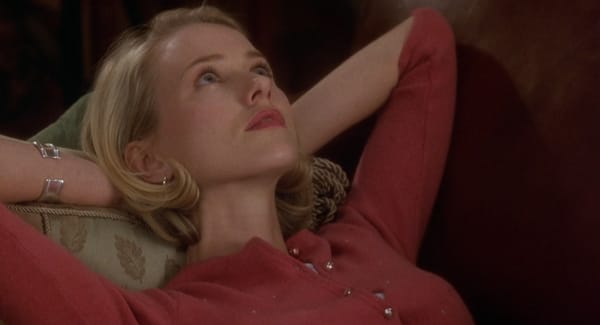What to Watch: Seoul Sisters
In theaters,"Return to Seoul" and "The Quiet Girl" are both ⭐⭐⭐⭐ new releases. On demand: "A House Made of Splinters" (⭐⭐⭐) and "Palm Trees and Power Lines" (⭐⭐⭐).

I was looking forward to the press screening of “Creed III” this week because I’m fascinated by the way Ryan Coogler and company have stripped the “Rocky” franchise down to its studs over the previous two movies and built it back up as a powerhouse Black sports saga. (Also, Jonathan Majors is in this one, and he is a talent to watch.) Unfortunately, the COVID bug finally bit me on the ass after three years of outrunning it – a mild case, thankfully, and I’m past the worst, but my film choices this week were limited to what I could watch in quarantine, via streaming links or DVD. Which was a fair amount, actually, including one of the very best films of 2022 that is at last reaching general audiences in 2023.
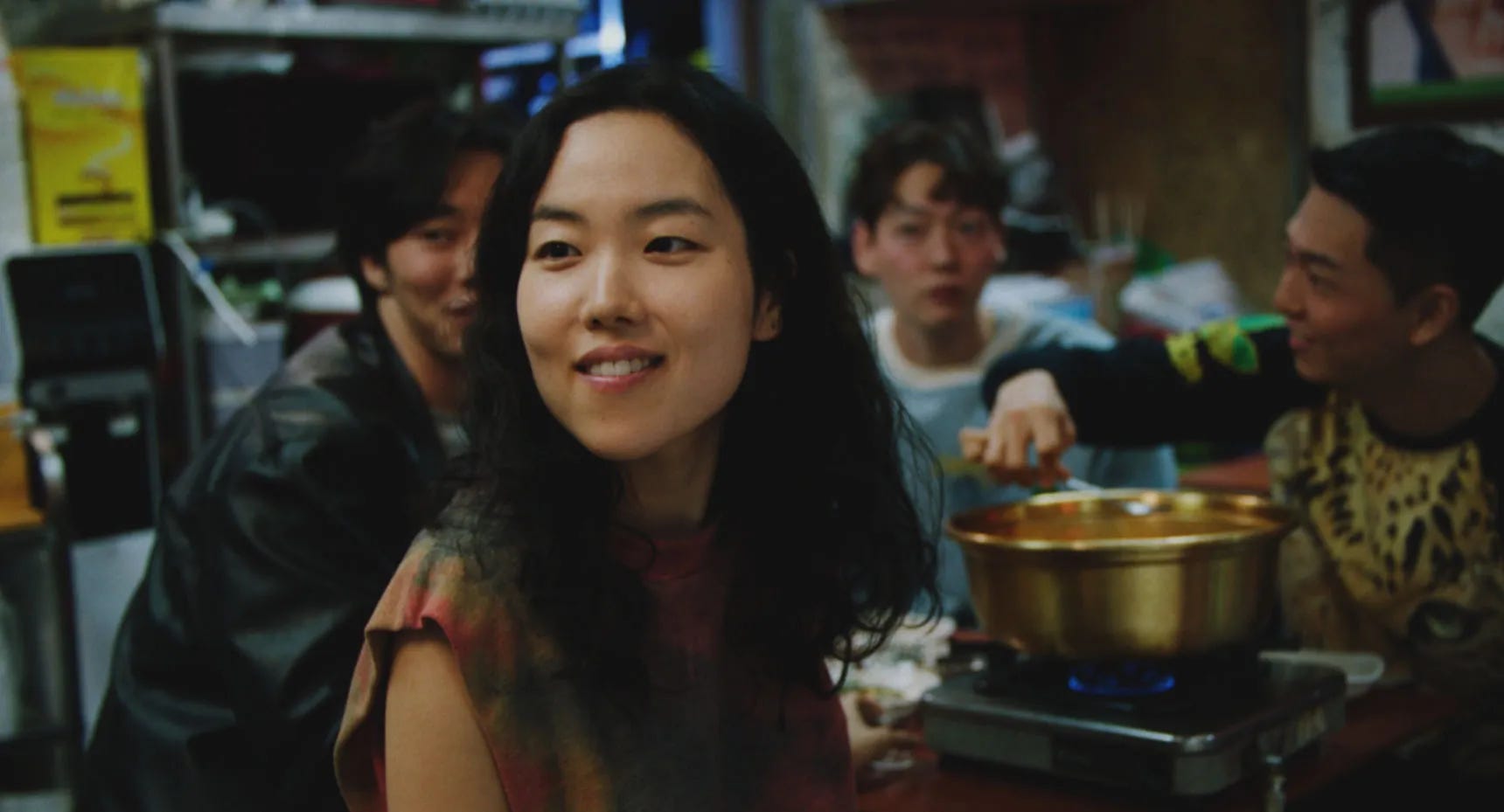
That film is Davy Chou’s “Return to Seoul” (⭐⭐⭐⭐), a nearly perfect South Korean drama of rebellion and reconciliation that continues its slow theatrical roll-out and reaches the Kendall Square and West Newton cinemas in the Boston area today. (A full national release schedule can be found here.) It’s hard to believe that Park Ji-min (above), a 25-year-old sculptor and painter, had never acted before, so transparently does she inhabit the body and soul of Freddie, a loose-living French adoptee returning to a home country she can barely comprehend. Freddie doesn’t speak Korean – she gets by well enough on French and a smattering of English – and she claims she’s not even in Seoul on purpose, since bad weather diverted a planned trip to Japan. Yet almost against her will she finds herself visiting the adoption agency that handled her case and unleashes a series of events and connections, a birth name (Yeon-hee — it means “docile and joyous”) and a birth identity, from which she’ll be running for the next several years.
“Return to Seoul” has the timespan of a classic Bildungsroman – a slow, meticulously observed coming of age that’s electrifying and heartbreaking by turns. A wild child even by Western European standards, Freddie’s a positive scandal to her fellow young South Koreans, like the helpful, proper Tena (a wonderful Guka Han) or the young man (Dong Seok Kim) she picks up at a bar and drags back to her hotel room for a one-night stand. When she does eventually make contact with her birth father (Oh Kwang-rok), she’s embarrassed to discover he’s a weepy clinger who assumes she’ll take her place as a permanent family member. Instead, Freddie embarks on a darker and more ambitious life path, and “Return to Seoul” checks in on her every few years, watching as she matures and hardens and tries to ignore the nagging blank space that is her unresponsive birth mother.
Park is pure quicksilver in the lead – a charismatic brat and her own worst frenemy. There’s a bar sequence where Freddie just says the hell with it and starts dancing by herself to a club tune (it was written for the film by composers Jérémie Arcache and Christophe Musset, but it sounds like a lost New Order song), and you may feel you’ve time-traveled back to the French New Wave, where young Jeanne Moreau is kicking over the chairs. Yet “Return to Seoul,” true to its title, stays locked into the culture clash surrounding its defiant heroine and inside her, and the movie leads up to a moment of reckoning that more than earns its grateful tears. One of the things I love about this movie is that the central mystery of Freddie’s life is allowed to remain just that, a mystery, despite being resolved enough for her and, perhaps, for us. Or maybe Freddie has simply realized that mothers can be misfits, too, and that hers may not be running away so much as running by her side.
(N.B. The trailer below is a killer but, in my opinion, gives away a bit too much. Proceed with caution.)
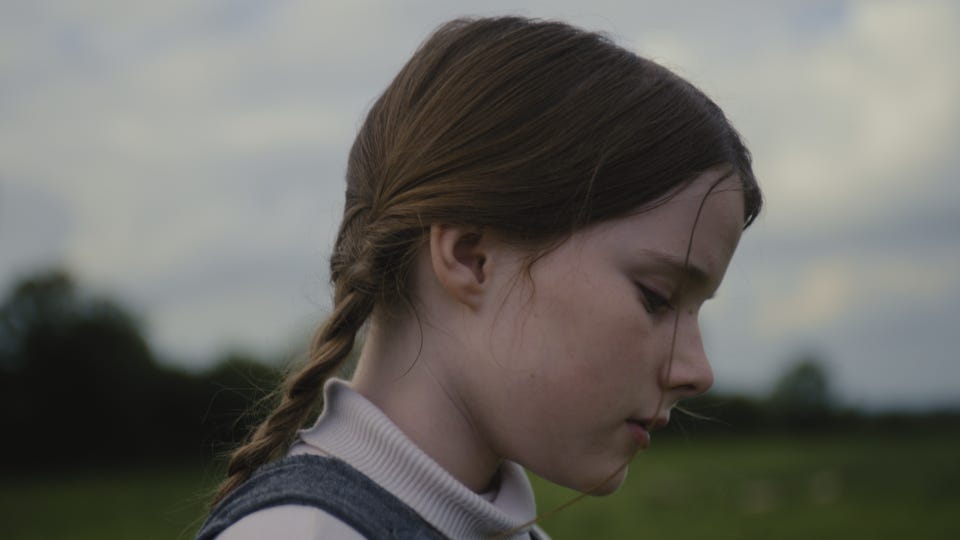
“The Quiet Girl” (⭐⭐⭐⭐, in theaters), from Ireland, is an Oscar nominee for Best International Feature Film because over half the dialogue is in Irish with subtitles; the movie’s as hushed as Cáit, the 11-year-old girl of the title, but it’s alive to all the mercies and sorrows that can go unsaid. Based on a novella, “Foster,” by Claire Keegan, it’s been written and directed by first-time feature filmmaker Colm Bairéad with a sensitivity that at times feels magical. Cáit (Catherine Clinch, above) is watchful, shy, unobtrusive and to her siblings and schoolmates a “weirdo.” Her father (Michael Patric), a bit of a brute, refers to her as “the one who wanders.” Living on a falling-down farm with a sprawling family that includes an exhausted, ever-pregnant Mam (Kate Nic Chonaonaigh), Cáit is shipped off for the summer to the dairy farm of a distant cousin, Seán (Andrew Bennett) and his wife Eibhlín (Carrie Crowley). There she discovers a human kindness she had never imagined existed, and the grave charm of “The Quiet Girl” is that we get to discover it alongside her. The story is simple; it’s the connection between an invisible girl and a woman who finally sees her that forms the backbone of this lovely, handmade film.
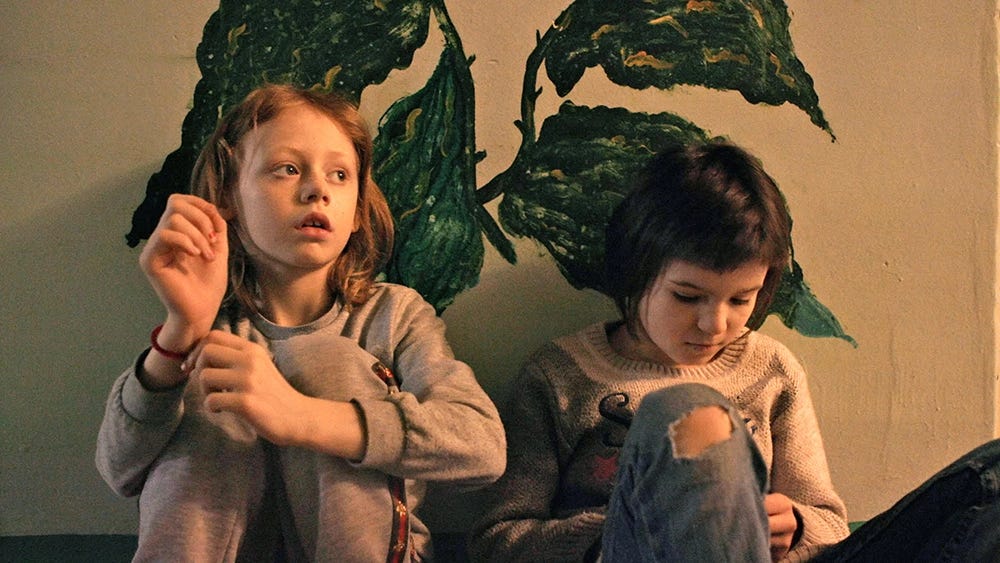
Speaking of children and Oscar nominations, “A House Made of Splinters” (⭐⭐⭐) has recently become available as an on-demand streaming rental at Amazon, Apple TV, YouTube and elsewhere. Perhaps the least known of this year’s nominated feature documentaries, Simon Lereng Wilmont’s heartbreaker about a Ukrainian children’s shelter puts us next to boys and girls as they wait in a sort of caring limbo for their mothers or fathers to have court dates and/or get into some semblance of shape to bring them home. Filmed before the Russian invasion of February 2022, it’s a portrait of a society already knocked back on its heels by earlier aggressions and by what seems at times to be a national alcohol addiction. Most of the parents are voices on the phone making promises they can’t keep; when one mother does come in for a visit, her young son – a boy who’s already shaping up to be a future offender – bursts into tears. Yet even as it looks out over these small wrecked lives, the movie holds out hope in the patience and affection of the shelter’s staff and the unquenchable spirit of the children. God knows where that hope lies buried now.

Watching “Palm Trees and Power Lines” (⭐⭐⭐, in theaters and available for on-demand rental), I was reminded of the 1985 Joyce Chopra film “Smooth Talk,” in which a young Laura Dern plays a bored teenager lured in by a creepy/charismatic older man played by Treat Williams. We never find out exactly what happens to the girl – whatever it is, it’s probably not good – whereas we find out exactly what happens to Lea (Lily McInerny, above left) when she goes off with Tom (Jonathan Tucker, above right), a sweetly smiling man in his 30s who seems so mature compared to Lea’s stupid little high school crowd. Jamie Dack’s debut feature, adapted from her 2018 short film and winner of a directing award at Sundance 2022, is the kind of movie you watch increasingly through your fingers, not able to look away from what the 17-year-old heroine can’t see or won’t. “Palm Trees” is well-made in the standard indie mode; it looks at squalid events with an even, unsensationalized gaze, and McInerny, a relative newcomer, is remarkable in a tricky role where she has to play smart, cynical, and gullible all at once. That said, the movie offers few surprises in its depiction of this downbound train ride, and while the final moments have been widely described as a gut-punch, it’s never clear why the gut needed punching other than in the service of a cautionary tale for teenage girls. Which, honestly, is more than enough, but how do you get them to see it?
Next week I’ll trot out my Oscar predictions, one of which is a pretty sure bet that Michelle Yeoh will win the Best Actress award for “Everything Everywhere All at Once.” Which is great, but what else of hers have you seen? Lucky you, the Criterion Channel has just launched “Michelle Yeoh Kicks Ass,” an 8-film retrospective that runs from “Yes, Madam!” (1985) — Yeoh’s first starring role pairs her with 1980s action queen Cynthia Rothrock — to the wu-xia film that conquered the planet, Ang Lee’s “Crouching Tiger, Hidden Dragon” (2000).
For hardcore classic-movie completists (of which I am one): Criterion also has a mini-festival of Paramount Pre-Code films that includes the extremely hard-to-find “Broken Lullaby” (1932), an Ernst Lubitsch drama filmed between two of his witty, sexy Maurice Chevalier musicals, “The Smiling Lieutenant” (1931) and “One Hour With You” (1932). Those movies are revered, while “Broken Lullaby” is almost completely forgotten – a curiously intense, at times turgid melodrama about a French WWI veteran (Phillips Holmes) so wracked with guilt over killing a German soldier during the war that he befriends the dead man’s family and fiancée (early-talkies superstar Nancy Carroll). The same source, a play called “The Man I Killed,” was refilmed by François Ozon as “Frantz” in 2016; there’s an interesting double-bill there that will probably never happen. “Broken Lullaby” is more curio than lost classic, but it you ever want to see how a great director can enliven and deepen middling material, watch the first fifteen minutes, which sees the famous “Lubitsch touch” applied to a biting anti-war message.
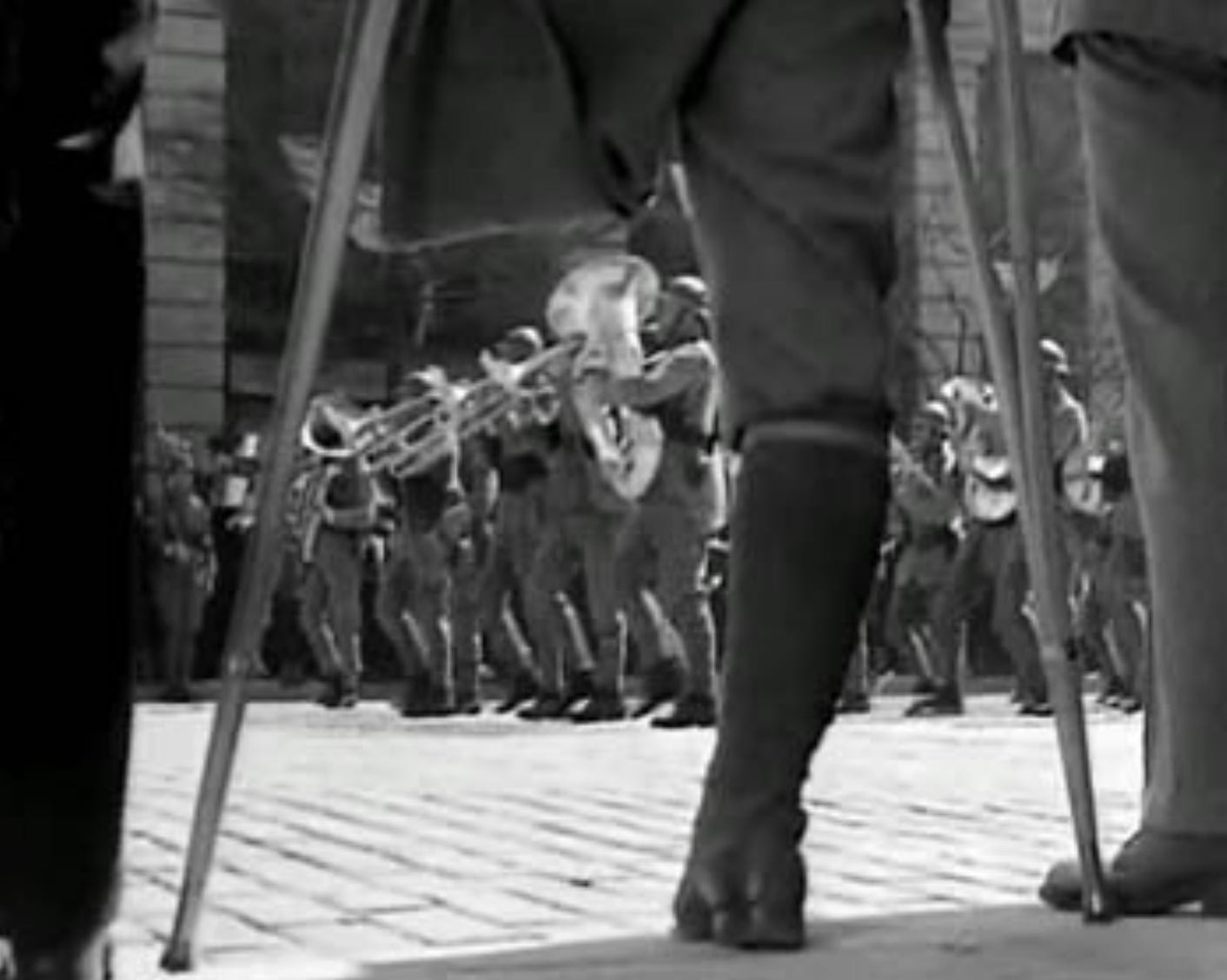
Finally, March is Oscar month on the Turner Classic Movies channel – every film shown during the month got at least one nomination in its year’s Academy Awards. This Saturday, March 4, is devoted to comedy, and the schedule culminates or collapses at 10:15 p.m. with “It’s a Mad, Mad, Mad, Mad World,” which some people swear is the funniest comedy ever made and some just think is the biggest. It does share a special space in my heart as one of the two possible first movies I ever saw – the other was “The Music Man,” and I’ll never know which was the first. (What was yours, by the way?)
Thoughts? Don’t hesitate to weigh in.
If you enjoyed this edition of Ty Burr’s Watch List, please feel free to pass it along to friends.
If you’re not a paying subscriber and would like to sign up for additional postings and to join the discussions, here’s how.




